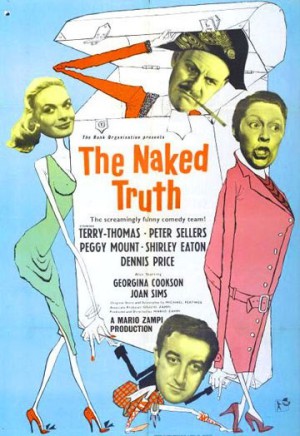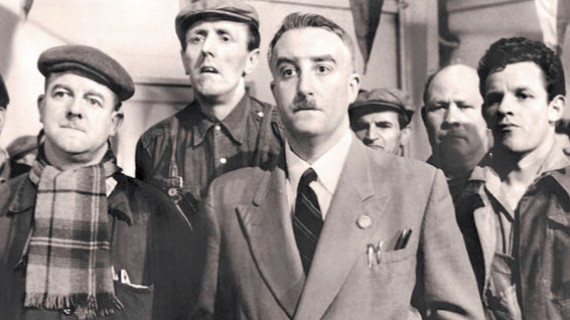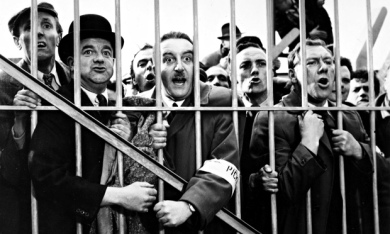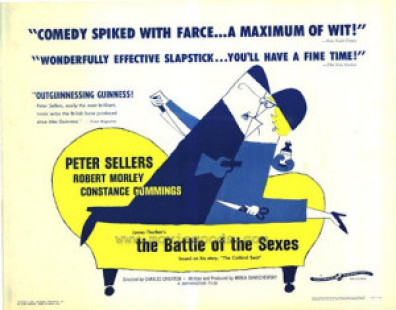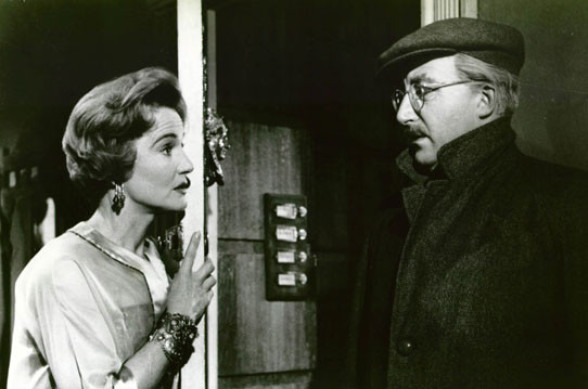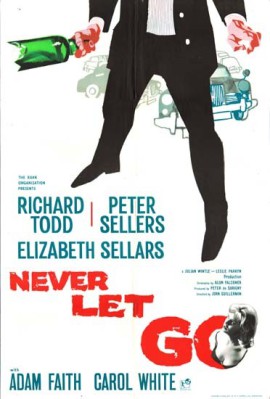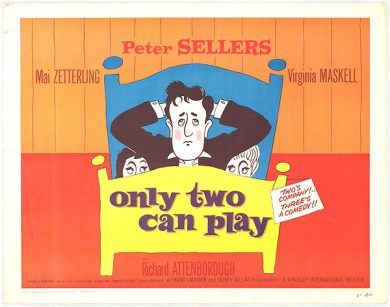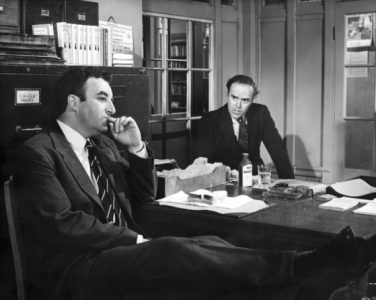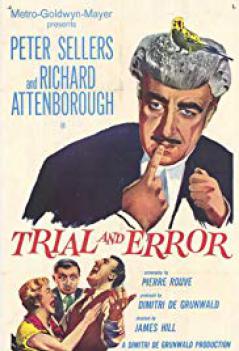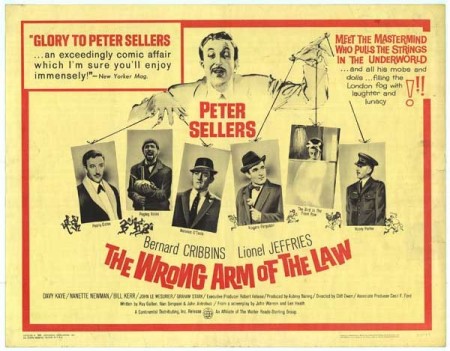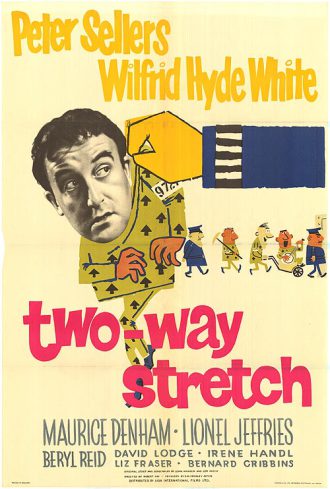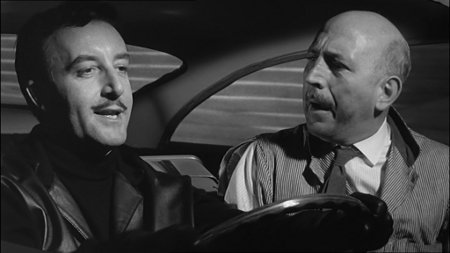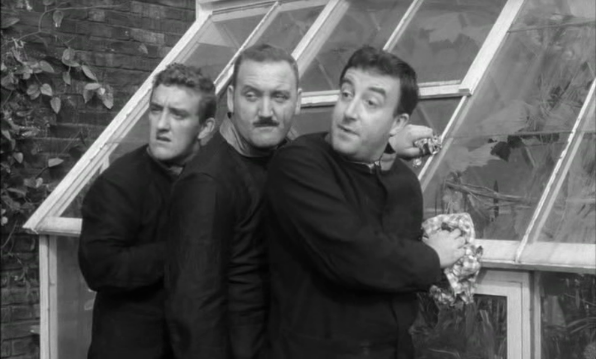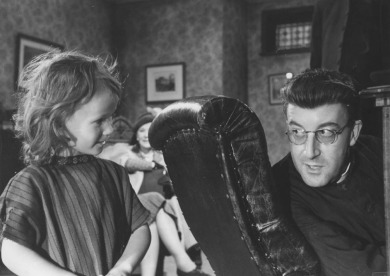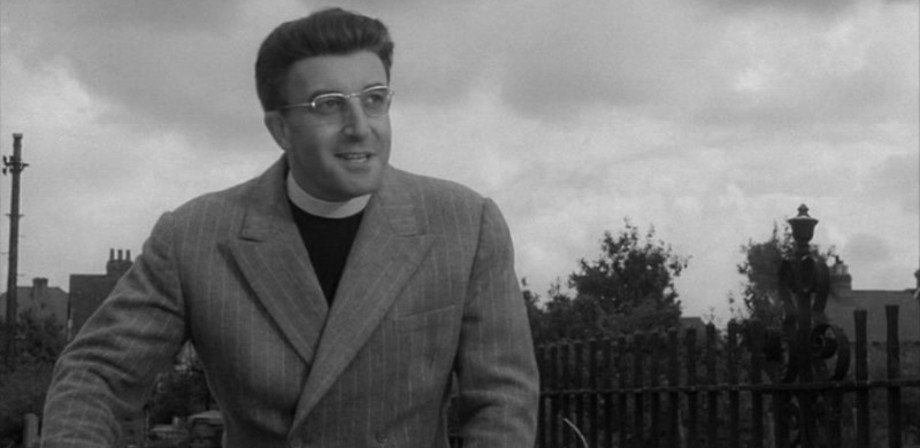
THE MANY FACES OF PETER SELLERS
Peter Sellers is mainly remembered now as Inspector Clouseau in the Pink Panther films, and for his tour-de-force playing three different characters in Kubrick's Dr Strangelove, but he worked himself into contention for these roles by appearing in some very good British comedies, some of which have been forgotten about, as well as in some straight roles which demonstrate his versatility. Much could be written about these films (although comedy films are usually difficult to write about, humour being so subjective) but this page is a look at just some of those films - and watching some of them again made me realise how much there is to be said about Terry-Thomas....
The Naked Truth (1957)
After starting to make an impact in films with The Ladykillers and The Smallest Show on Earth, one of Sellers' first 'starring' roles was in The Naked Truth (1957) but this is, for me, one of those films that looks better on paper that it does on celluloid. The cast, and the premise, is very promising: Dennis Price plays a blackmailer, with Sellers, Terry-Thomas, Peggy Mount and Shirley Eaton four of his intended victims. Sellers is cast as Wee Sonny MacGregor, a TV show host who fancies himself as an AC-TOR (despite the misgivings of his manservant, played with gloomy nervousness by Kenneth Griffith), and therefore decides that he will assume a variety of disguises to get his own back at the blackmailer, which gives Sellers ample opportunity to play a wide range of parts. He therefore has a field day, but apart from the odd amusing scene these are fairly unmemorable, and overall I find these kinds of cameos quite tedious, perhaps that part of my brain that would find The Goons amusing is missing. Here's the scene where Dennis Price first confronts Sellers with his expose magazine 'The Naked Truth':
Despite Sellers' character disgusing himself as a municipal official, a cod Irishman and a country gentlemen out for a weekend's shooting, most of the best moments in the film go to Terry-Thomas as he tries to hide the whole sordid affair from his wife, and, as with Heavens Above! (see below) there is a rushed and unsatisfactory ending tacked on to the film; but it was a film a couple of years later that really set the cinematic seal of approval on Sellers.
I'm All Right Jack (1959)
With the possible exception of his trip role in Dr Strangelove, Sellers' performance as Fred Kite, the bumptious shop steward in I' m All Right Jack is surely the role for which he is best remembered pre-Clouseau. I've written about this superb film in the context of it being a Boulting Brothers film on the current home page, and although there is so much to cherish throughout, it is hard to denthy that the film belongs to Sellers, despite the fact that the nominal star is Ian Carmichael as Stanley Windrush, who, along with Richard Attenborough, Dennis Price and Terry-Thomas, reprises his role from Private's Progress, four years earlier; the key addition is Sellers.
It is hard now to know which came first, Sellers' depiction of a pompous, Russian-loving union shop steward which defined the image for a generation, or whether he was playing up to an already existing image; I'd love to see the script and to know at what stage Sellers was picked to play the part (or was the part written for him?). For those who don't know the film, Stanley Windrush (Carmichael), although clearly upper-class and university-educated, is placed as a worker in a factory by Cox (Attenborough) and his uncle Bertram Tracepurcel (Price) for their own reasons, where he meets the shop steward, Fred Kite, in thrall to the Soviet Union and prone to using expressions like 'brothers' and 'comrade':
As the film progresses, Kite finds himself increasingly embroiled in events that lie beyond his control, and even at home his wife (Irene Handl) turns the tables on him,and decides if he is going on strike, then so is she so no more meals on the table. It is his intransigence that is so wonderful; although the line in the clip above "Ah, Russia, all them cornfields and ballet in the evening" is one of the most famous, one of the most perfect scenes is where he goes in with his committee to demand of Major Hitchcock (Terry-Thomas) that Windrush is sacked, only to find that Hitchcock in agreement. Automatically reverting to his default position that if management think it's white, then it must be black, he comes out with the classic line:
We do not, and cannot, accept the principle that incompetence justifies dismissal, that is victimisation!
A film that it's very hard to find fault with, and surely this is Sellers' most perfect performance.
Battle of the Sexes (1959)
Sellers' performance in Battle of the Sexes (1960) is often regarded as one of his best, and certainly an underrated one, but again I find that his role here relies too much on cariacture and not enough on observation and detail, unlike his best roles.
When old MacPherson (Ernest Thesiger), the head of an old, long-established firm of tweed manufacturers in Edinburgh, dies, his son Robert (Robert Morley) takes over, but unfortunately he has just been on a trip to the US and is much taken with an American efficiency expert, Angela Barrows (Constance Cummings), that he meets up with. Seemingly on an impulse he invites her to see what she can do with the business, and she soon creates havoc by revolutionising their staid, out-of-date working practices. Sellers plays Mr Martin, the firm's accountant, who decides to fight back, initially by sabotaging the new intercom and adding machine that Mrs Barrows has brought in:
Martin's efforts fail, as Mrs Barrows is made of sterner stuff and MacPherson cannot be persuaded to get rid of her, so he comes to a decision; he will have to kill her....
The scene where he plans to do so should have been one of the highlights of the film, but it is handled in an incredibly cackhanded and amateurish manner, reminding me of several lesser films (in fact more of substandard cartoons). This sort of black comedy is OK up to a point, but this is a rather underwritten idea, which at only 1 hour 20 mins feels as though it might have been a short play (in fact it's based on a James Thurber short story) and Sellers feels to me as though he's on auto pilot. It also has to be said that these days it feels rather tiresome (there are some awful 'jokes' at the start, which I can only imagine were aimed at an (undemanding) American audience, about men in skirts etc, and even for the time one can only wonder that they couldn't seem to find a single Scottish actor for any of the main roles.
Never Let Go (1960)
A much better showcase for Sellers' acting ability is Never Let Go (1960), which features that rarity; a straight performance from Sellers. He plays Lionel Meadows, who runs a car dealership but also runs a profitable line in handling stolen cars that are nicked to order by Adam Faith, leader of a gang of thugs in a small town. When Richard Todd's perfume salesman's car is stolen, he refuses to 'leave it', and despite indifference from the police he pursues the thieves who lead him to Meadows.
It is a testament to Sellers' acting skills that one never feels that this is a comedian who is playing at straight roles; he brings a real terror to the part and it is certainly a great regret that he didn't do more non-comic acting. This film deserves to be much better known, but I've now written about it in the 'Unsung films' section so I won't add any more comments here.
Only Two can Play (1962)
An adaptation of Kingsley Amis' 'That Uncertain Feeling' (and regular readers of this site, if there are any, will know that I've not read any of Amis' work), Only Two can Play finds Sellers actually playing something approximating to a human being, with all the foibles that that entails, as well as the virtues. Set in the fictional town of Aberdarcy (filmed in Swansea, see www.reelstreets.com for lots of 'then and now' shots) he plays John Lewis, a librarian who positively seethes with sexual frustration, although he is married to Virginia Maskell with two young kids. When he meets up with Mrs Gruffydd-Williams (Mai Zetterling) he is more than willing to indulge himself with an affair, but fate intervenes and he never manages to get her into bed, but she does exert her influence, as the wife of a prominent local man, to help Lewis get promoted to a job that he was reluctant to apply for himself through laziness.
Watchable but rarely much more than that, there are really only two laugh-ou-loud scenes, both involving him trying to consummate his relationship with Mrs G-W, the first where he has to make himself scarce when her husband returns home unexpectedly, and the other where they both disappear off instead of watching a play written by his detested rival (played by Richard Attenborough). The problem is, he is the dramatic critic for the local rag:
There are some incidental pleasure, provided by reliable support players such as Kenneth Griffith (left) as Lewis' co-worker Jenkins, who provides some genuine Welshness to the film, John Le Mesurier and Raymond Huntley, but overall it feels rather flat and, rather unusually, Sellers doesn't really dominate the film; it is quite easy to imagine someone else in the part, and it's not often that one can say that about a Sellers film.
Trial and Error (1962)
This is a very strange little film which I'd never even heard about, let alone seen, until a few weeks ago (writing now in December 2018); it's basically a double hander with Sellers and Richard Attenborough (having a great time as the downtrodden and insignificant Herbert Fowle) set in Fowle's cell as he is about to go to trial for the murder of his wife Doris (played in flashback by Beryl Reid), with Sellers playing his barrister Wilfred Morgenhall. We initially perceive Morgenhall to be a barrister of great wisdom and experience, yet it soon turns out that, despite his advancing years, this is in fact his first case, or dock brief. Fowle is entirely unaware of the law, proceedings or indeed anything in relation to his situation, and just wants to plead guilty and take his punishment, presumably hanging, but Morgenhall is not to be so easily fobbed off.
We follow first Morgenhall and then Fowle in their reveries, as we see Fowle describe his home live with Doris and subsequently their lodger, Frank (David Lodge). It would be difficult to find a more incompatible couple, as Attenborough plays a comic variant of his character in Seance on a Wet Afternoon (with a bit of Christie thrown in) married to Reid's brassy, loud wife, laughing raucously at all manner of jokes and insisting on having the radio on full blast whilst Fowle just wants to tend to his pigeons that he keeps out the back. It seems an open and shut case, but Morgenhall has a brainwave; 'the surprise witness'. Having hit on this idea, he persuades Fowle to picture the court scene, with himself as the judge, as seen in this clip:
Morgenhall comes up with further unworkable suggestions, all played out by the pair, before the neat but obvious ending. My first impression was that this was another inconsequential semi-comedy, but I've watched it again and it holds a certain fascination, mainly because it is so unusual. Sellers manages to rein in his tendency to overplay his role, which allows Attenborough to dominate the screen in his portrayal of the hapless Fowle.
Two Way Stretch/The Wrong Arm of the Law (1960/1963)
These two fondly remembered films are completely typical of late 50s/early 60s comedies at their best - stuffed to the rafters with great character comedy actors, gently humourous situations, no real belly laughs but they always leave one with a warm glow. They could be criticised for being too cosy I suppose, and they hardly qualify as satire, but they were understandably incredibly popular, and when one looks at the sort of comedy films that were being churned out in the late 60s and early 70s - including, I'm afraid to say, some of the later Carry Ons, unbelievably overrated films - they now look like genius.
These are two of the best; in both cases Sellers is a crook playing opposite Lionel Jeffries, who represents authority, the police in the case of The Wrong Arm of the Law and the prison service in the case of Two Way Stretch. Like almost all these films at the time, being a crook is represented as a honourable profession where thieves come quietly, would never use violence, and the whole underworld is shown as a game with certain rules which eveyone - criminals, police, prison wardens and governors - abides by. It seems completely pointless to me to criticise these films for their unreailty - of course they are, they're comedies!
One fascinating aspect of Two Way Stretch, which I've not seen anyone else pick up on, is that it seems to be a precursor of 'Porridge' in the 70s. I would love to know if Clement and Le Frenais either conciously or subconciously modelled Fletcher on Sellers' character, 'Dodger' Lane; certainly Mr Mackay owes more than a little to PO 'Sour' Crout, the Lionel Jeffries' character ("Shut up when I'm talking to you!") and the completely wet and ineffective governor, played by Maurice Denham, who is only interested in his prize marrows, is mirrored by the equally wet blanket of a governor in 'Porridge'. This opening scene sets the scene very nicely:
If you've not seen these films before, treat yourself; if I was pushed I'd plump for Two Way Stretch on balance, but both are excellent.
Heavens Above! (1963)
Again, I've written about Heavens Above! on the Boulting Brothers page; this was the first time in three years that Sellers had teamed up with John and Roy Boulting since I'm All Right Jack, but although it was always fairly unlikely that it would reach the heights of IARJ, there are unfortunately clear signs of decline and Sellers is unable to do very much with his role of the Rev John Smallwood, a well-meaning but naive parson mistakenly sent to the town of Orbiston Parva, where he manages to antagonise almost every section of the community there. Whilst there are some excellent moments - see the clip on the Boulting Brothers' page on this website for example - it would have been very interesting if the same situation had been played as straight drama; in IARJ we laugh at Fred Kite, but it is impossible to do so with John Smallwood. Although I suspect that most of the audience have little sympathy for Smallwood, there are precious little laughs to be had when the gypsy family he has taken in abandon him, having stolen lead off the church roof and most of the valuable items in the house; instead there is feeling of sadness at the inevitability of it all.
This scene shows the archdeacon (Cecil Parker), who recommended the other John Smallwood in the first place, visiting to see what is going on, and being confronted by the Smith family, ensconced in the vicarage, with Eric Sykers and Irene Handl in charge:
The ending of Heavens Above! is especially weak, but less than a year later Sellers played Inspectotr Clouseau for the first time, and his career took off into the stratosphere; but there is much to treasure in these earlier (some, myself certainly included, might say superior) films.









